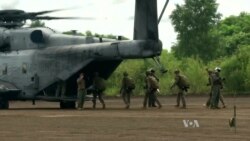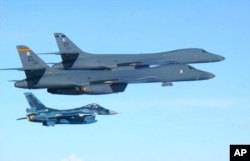U.S. officials said the United States remains unwavering in its commitment to Asian allies in the wake of threats from North Korea, while indicating diplomacy "has to be backed by a strong military consequence."
During a visit to Japan, the top U.S. general restated Washington's "ironclad commitment" to the security of its closest ally in Asia.
Joseph Dunford, Charmain of the Joint Chiefs of Staff, told Japan’s Chief of Staff of Self-Defense Forces, Admiral Katsutoshi Kawano Friday "I think we made it clear to North Korea and anyone else in the region that an attack on one is an attack on both of us."
"And that's very, very important for deterrence," said Dunford, who visited South Korea and China before arriving in Japan.
Also Friday, Dunford said during a meeting with Japanese Prime Minister Shinzo Abe in Tokyo that the military level of the bilateral relationship between the U.S. and Japan was "rock-solid."
At that meeting Abe once again expressed his appreciation to U.S. President Donald Trump for stating all options were "on the table" in regard to North Korean hostility.
WATCH: US to North Korea: US Stands Ready to Defend Itself and Allies
Tokyo remains on alert as fears about North Korea's missile and nuclear weapons programs have increased in recent weeks, after Pyongyang threatened to fire missiles towards the Pacific U.S. territory of Guam, which would have flown over Japan.
Talks in Washington
In U.S.-Japan defense and diplomatic talks in Washington Thursday, U.S. Defense Secretary Jim Mattis said Washington would take immediate and specific actions to take down any missile launched by North Korea toward the territory of the U.S. or its allies.
Mattis and Secretary of State Rex Tillerson, in "two-plus-two" meetings with Japanese Defense Minister Itsunori Onodera and Foreign Minister Taro Kono, reaffirmed Washington's commitment to protecting Tokyo as Pyongyang intensifies its threats.
"Together, we will deter and, if necessary, defeat any threat. Any initiation of hostilities will be met with an effective and overwhelming response. Our two nations will demonstrate the strength of our alliance by continuing those bilateral activities and by enhancing cooperation with the Republic of Korea," said Mattis.
Military option 'prudent'
As the top U.S. diplomat, Tillerson said Washington would continue diplomatic efforts "first and foremost," but "it is only prudent" that military action remains a choice.
"Obviously, any diplomatic effort in any situation where you have this level of threat that we're confronted with — a threat of proportions that none of us like to contemplate — has to be backed by a strong military consequence if North Korea chooses wrongly," Tillerson said.
The meetings came amid heightened tensions on the Korean Peninsula after North Korea threatened to fire missiles into the waters close to the U.S. Pacific territory of Guam. The missiles would have to fly over Japan to reach their target, worrying Tokyo that warheads or missile debris could fall on its territory.
On Wednesday, two Japanese F-15 jet fighters conducted air maneuvers with two U.S. Air Force B-1B Lancer bombers over the southwestern part of the Korean Peninsula. The exercise was meant to improve interoperability and bolster combat skills, Japan's Air Self Defense Force said in a news release.
Japan's Kono said talks with Pyongyang would not be possible until it stopped its nuclear provocation.
"There's no sense to dialogue for the sake of dialogue," Kono said via a translator, adding that "the international community will continue to apply maximum pressure to North Korea."







